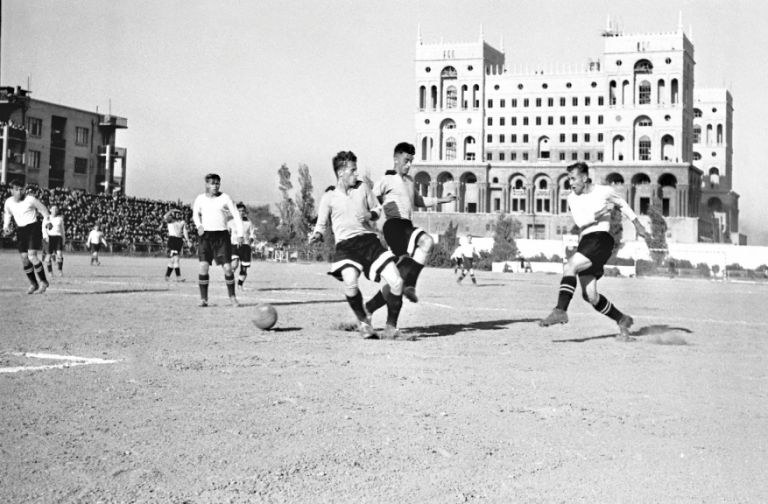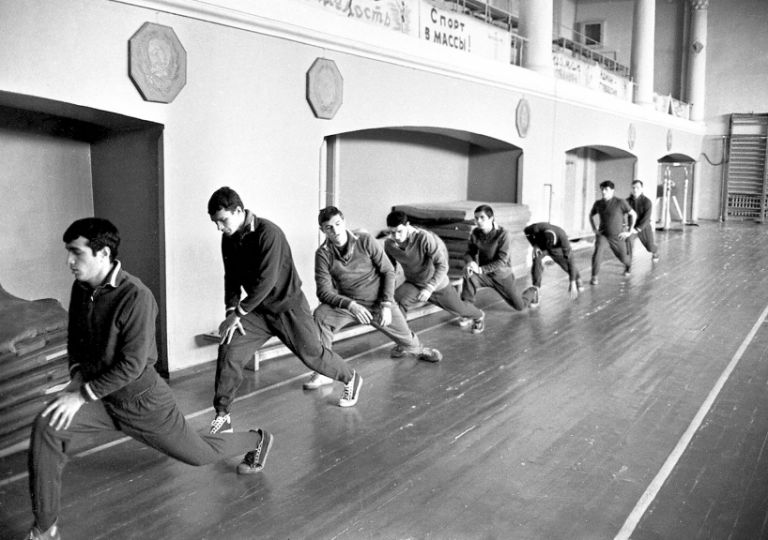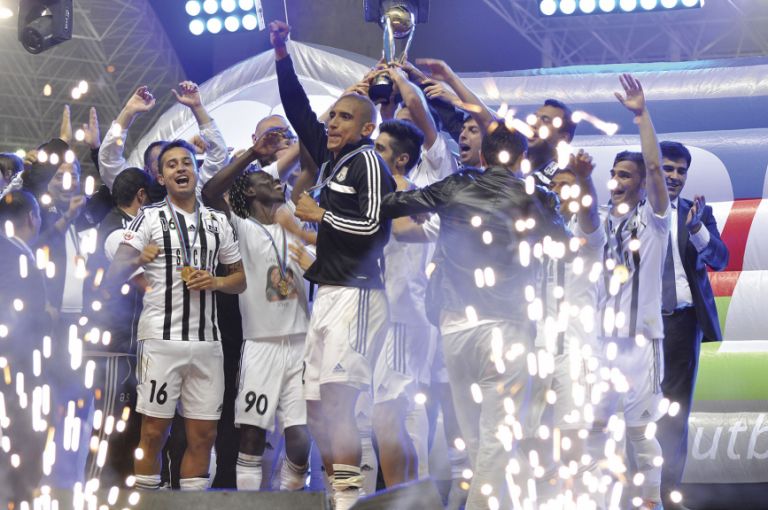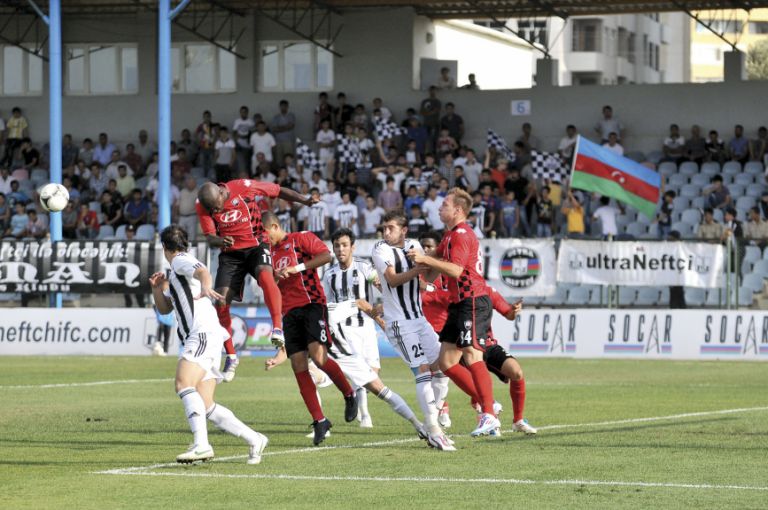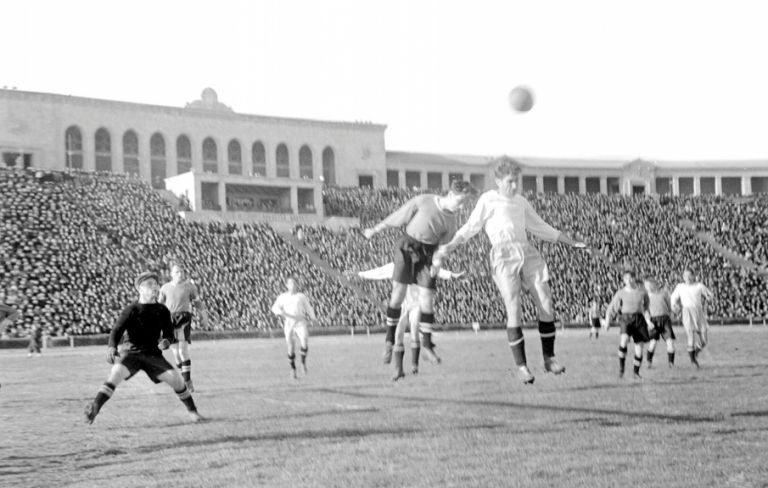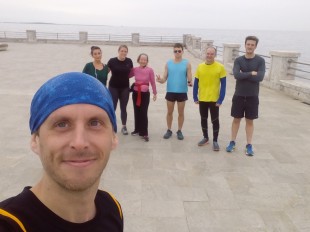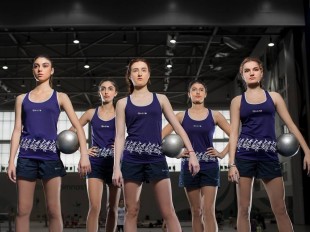Much of Azerbaijan’s football history, which began in 1911, is associated with the Soviet period during which the most successful Azerbaijani club was Neftchi. Neftchi was the only club to represent Azerbaijan in both the first and second divisions of the USSR’s national championship in every year apart from 1968, when it was joined by Dynamo Kirovabad (now Ganja). 2017 is quite symbolic for the “Black and Whites,” as the club, founded in 1937, prepares to celebrate its 80th anniversary.
Club for the oil workers
Soviet football championships between city teams were first held in 1922, before Neftchi were formed. In 1936, championships were created between clubs and although a number of sectors were represented by football teams from the Azerbaijan Soviet Socialist Republic (ASSR), the oil industry seemed to have been forgotten. However, Baku had already earned itself a reputation as an oil city and those working with this “black gold” soon set up a team of their own. The club was formed on 18 March 1937 and it didn’t take long to think of a name – the oil workers wanted the club to be called Neftchi (“oil workers” in Azerbaijani – Ed.).
Football fans will probably remember that in the 1980s the club had two names. In 1937, it was founded as Neftyanik because Russian was the predominant language at the time; all documentation in Soviet times was rendered in Russian and required approval from Moscow. The name Neftchi began to gain ground in the 1950s, as this was the preferred name of many of the club’s fans and hence Azerbaijani-language books published in the 1950s often referred to the club as Neftchi. Meanwhile Russian-speaking newspapers and magazines kept writing Neftyanik.
Finally, in 1968, the club’s official name was changed and both Russian- and Azerbaijani-speaking media began calling it Neftchi. Of course, this couldn’t have been possible without approval from above; initiated by the secretary of the Central Committee’s ideology department, Jafar Jafarov, the republic’s leadership sanctioned the change, justifying it by the fact that since the club represented Azerbaijan, it should have an Azerbaijani name.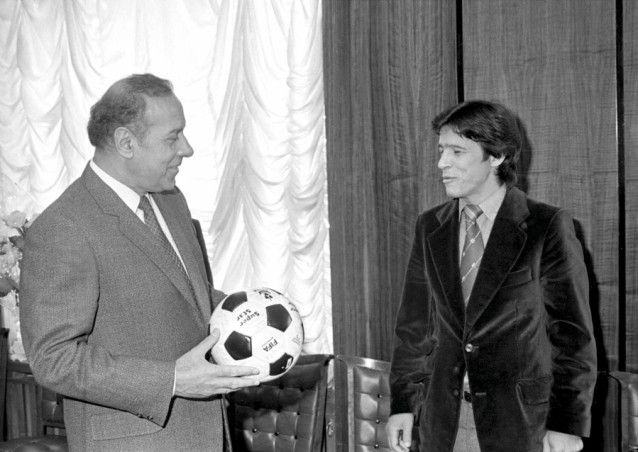 Heydar Aliyev, then First Secretary of the Azerbaijan SSR, meets with Neftchi players on 10 May 1982
Heydar Aliyev, then First Secretary of the Azerbaijan SSR, meets with Neftchi players on 10 May 1982
Early years
Neftchi played their first competitive game on 24 May 1937, beating rivals Dynamo Yerevan 1:0 at the Dynamo stadium in Baku in the last 128 of the USSR Cup, watched by a crowd of 5,000 spectators. The goal scored by Pavel Shtirlin in the 87th minute went down in history as the first goal scored by Neftchi. In their first year in the Soviet championship, Neftchi competed in Group G and finished 12th of 12 teams. They also played in the USSR Cup that year: after beating Dynamo Yerevan in the round of the last 128 and Dynamo Batumi in the round of the last 64, Neftchi were knocked out by Dynamo Tbilisi in the round of the last 32.
Between 1938 and 1941, Neftchi also played in local Azerbaijani and Caucasus championships. At the start of World War II, the players had to join the army. Mirmehdi Aghayev, who played for the club before the war, was among those killed in action. As the war drew to an end, the team gradually resumed operations and in 1944, Neftchi returned to the Azerbaijani championship, becoming champions the following year.
The Top Division was expanded in 1949 and Neftchi made its debut in Group A. The team included Tofig Bahramov, who subsequently became a world famous referee, and the renowned Alakbar Mammadov. Tofig Bahramov was the captain, although he only played for the team in the Azerbaijani championship and wasn’t considered a key player. After a tackle by teammate Valentin Khlistov during a training session, Bahramov received an injury that brought his playing career to a premature end at the age of only 25.
Alakbar Mammadov was one of the best players and most recognisable figures in the history of Azerbaijani football. The Azerbaijani forward achieved the biggest successes of his career while playing for Dynamo Moscow where he became a USSR Top League champion four times – in 1954, 1955, 1957 and 1959. On 4 September 1955, Mammadov scored four goals against Milan in a friendly match in the legendary San Siro stadium which Dynamo won 4:1. No other Azerbaijani player has ever achieved anything of these proportions.
Neftchi played its first Group A match against the Air Force Club in the then Lenin Stadium (currently the Ismat Gayibov Stadium) on 17 April 1949 and won 1:0. They finished the Top Division in 14th place in their debut season; having made an excellent start and topping the table after five rounds, the Black and Whites subsequently plummeted to the bottom due to a lack of experience.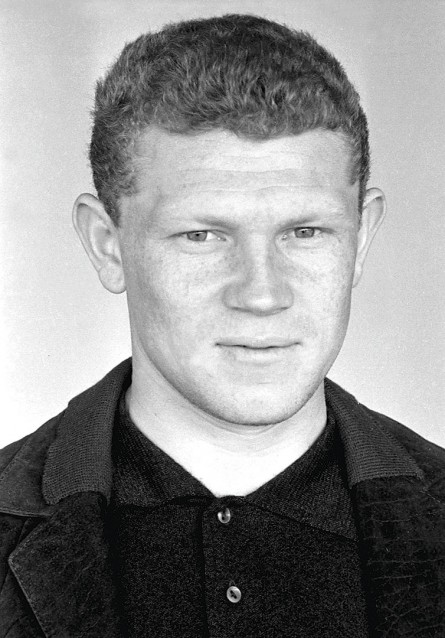 Anatoliy Banishevskiy in 1966, his most successful year
Anatoliy Banishevskiy in 1966, his most successful year
Bronze in 1966 and the legendary “Banya”
The 1966 season stands out in the history of Neftchi, as the club achieved its biggest success in the USSR championships by finishing third. By beating Spartak Moscow 3:0 in the last game of the championship in the current Tofig Bahramov Stadium on 30 November, the Black and Whites, coached by 31-year-old Ahmad Alasgarov, reached 45 points and finished only two points short of the Rostov Army Club who were second. Dynamo Kiev won the championship with 56 points.
Anatoliy Banishevskiy, a legendary player not only for Neftchi but for the entire USSR, scored two goals, in the 18th and 21st minutes in the game. He was so faithful to his native Baku and Azerbaijan that he dedicated 14 years of his career (1964-78) to Neftchi, playing 288 games and scoring 136 goals. Playing alongside Banishevskiy in attack were Kazbek Tuayev and Eduard Markarov and together they were widely regarded as one of the best attacking trios in the Soviet Union. The 1966 season also proved the most successful for Banishevskiy - often endearingly referred to as “Banya” - as he also won a bronze medal that year with the Soviet national team that finished fourth at the World Cup in England. Selected by Soviet head coach Nikolay Morozov at the age of just 19, Banishevskiy played in seven games and scored eight goals in the tournament. The header he scored against Brazil at the Maracana Stadium from 40 metres out is still considered a masterpiece. Banishevskiy then won a silver medal at the 1972 European Cup. His attacking teammates at Neftchi, Kazbek Tuayev and Eduard Markarov, also played for the national team. The 1966 bronze medal team included the likes of Sergey Kramarenko, the brothers Adil and Yashar Babayev, Mubariz Zeynalov, Nikolay Bogdanov, Vladimir Brukhti, Vyacheslav Semiglazov, Anatoliy Gryazev, Valeriy Hajiyev and other renowned players.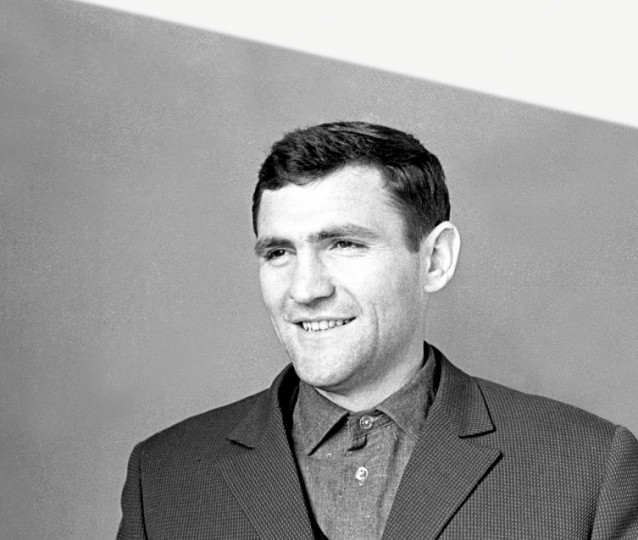 Kazbek Tuayev, pictured here in 1967, played alongside Banishevskiy and Eduard Markarov in what was one of the most feared attacks in the Soviet Union
Kazbek Tuayev, pictured here in 1967, played alongside Banishevskiy and Eduard Markarov in what was one of the most feared attacks in the Soviet Union
Two years later, in 1968, the club began the 30th USSR championship as Neftchi rather than Neftyanik. It was a significant season for Azerbaijani football: Dynamo Kirovabad had qualified for the Top Division, meaning that two Azerbaijani clubs were represented in the Soviet premier league for the first time. This was the only such year, because Dynamo were relegated to the second division at the end of the season.
Neftchi also dropped to the second division in 1972 and spent the 1973-76 seasons there. Elbrus Abbasov played a great role in the team’s comeback. By scoring 28 goals, he became the second division’s top scorer, helping the Black and Whites finish second and qualify for the top flight again. Playing for Neftchi in the 1970s were famous figures like club captain Ali Rahmanov, Asim Khudiyev, Samad Gurbanov and Samadaga Shikhlarov. Leftwinger Samad Gurbanov’s pace even earned him the nickname of “Zhiguli,” after the ubiquitous Soviet-era car. Forward Samadagha Shikhlarov made history for scoring the club’s 600th goal against Ararat Yerevan. One of Azerbaijan’s first FIFA referees Asim Khudiyev had also been a reliable defender.
The 1980s were more successful than the 1970s for the team. It was during this decade that the club, coached by Agasalim Mirjavadov, finished the championship in 9th place, registering its best performance since 1966. The team was known for its great attacking trio which included Iskandar Javadov, Mashallah Ahmadov and Igor Ponomaryov and was central to many of the club’s victories. Javadov and Ahmadov were capable of scoring many goals, while Javadov also possessed good leadership qualities and was the team’s skipper from 1979 to 1986. Ponomaryov was a playmaker with outstanding passing skills, also renowned for his penalties. He won a gold medal at the Seoul Olympic Games in 1988 and is still the only Azerbaijani footballer to have won Olympic gold.
Neftchi also competed for the Soviet Cup and despite reaching the semifinals of the competition in 1967, 1968, 1970 and 1971, they never managed to win it. In 1988, they reached the final of the USSR Football Federations Cup but lost to Kayrat Almaty.
Overall, 1988 was a disappointing season for the club, as they finished 15th and were relegated to the second division. Agasalim Mirjavadov coached them in the first half of the season and Yuriy Kuznetsov in the second, but neither could save the team from relegation, meaning that this was to be Neftchi’s last season in the Top Division.|
A number of Neftchi players made great strides at the Soviet national team level by winning medals at World and European championships. In 1978, Igor Ponomaryov won the European Youth Cup and was a silver medalist a year later. The same national team included another Neftchi player, Vladimir Mikhaylevskiy. The following Neftchi players represented the USSR’s first and Olympic teams: First team Yuriy Kuznetsov (1955, 5 caps, 6 goals) Olympic team Valeriy Hajiyev (1967-68, 2 caps) |
Modern era
Like other republics, after the collapse of the USSR Azerbaijan established its own national football league in 1992. Only two teams – Neftchi and Qarabag FK - have played in all the 25 championships held to date. The Black and Whites won the first Azerbaijani national championship having begun as clear favourites, since many of the players playing for the club at the end of the Soviet period remained: Yunis Huseynov, Samir Alakbarov, Arif Asadov, Rasim Abishov, Asgar Abdullayev and Novruz Azimov. The most successful Neftchi coach in Soviet times, Ahmad Alasgarov, led the club to its national title as well.
Neftchi also earned Azerbaijan’s first points in Europe in a European Cup Winners’ Cup match against APOEL Cyprus played at the Mehdi Huseynzade Stadium in Sumgayit on 24 August 1995, which ended in a goalless draw. In 2012, Neftchi became the first Azerbaijani team to reach the group stages of the Europa League. Interestingly, this was achieved in another match against APOEL of Cyprus, winning 3:1 on 30 August away from home.
More international success came at the Commonwealth Cup in Moscow, between the winners of the national leagues of the former Soviet republics. Neftchi, coached by Agasalim Mirjavadov, won this Cup on 22 January 2006, beating Kaunas of Lithuania 4:2 in the final. Two years in row, the team was drawn against Armenian rivals Pyunik Yerevan in the competition: Neftchi won the quarterfinal game 2:0 in 2005 and the following year Pyunik forfeited the match.
Neftchi currently play in the Topaz Premier League and have already set a number of records. The club is the most decorated Azerbaijani team to date, having won 15 medals including eight gold, two silver and three bronze. Neftchi have also won the most titles (eight) and the most National Cups (six). Three clubs have won the Azerbaijan Supercup: Neftchi have done so twice while Qarabag and Khazar Lenkeran have both won it once.
Many of the footballers awarded with the “Order of Shohrat,” the highest state honour from the President of Azerbaijan, played for Neftchi. They are Alakbar Mammadov (1995), Anatoliy Banishevskiy (1996), Kazbek Tuayev (2000), Iskandar Javadov (2006) and Agasalim Mirjavadov (2008).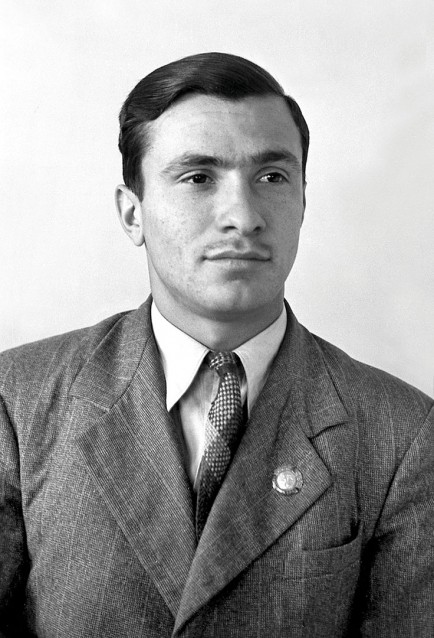 Alakbar Mammadov was one of the best players in the history of Azerbaijani football. This photo was taken of him in 1950
Alakbar Mammadov was one of the best players in the history of Azerbaijani football. This photo was taken of him in 1950
Anniversary celebrations
Unfortunately, this season, during which the club celebrates its 80th anniversary, hasn’t been successful. The team is currently fifth (of eight) but spent a long period at the bottom of the table and suffered its heaviest loss to date in the history of the Azerbaijani championships: a 0:8 defeat at home to Qabala on 10 September 2016. Following this, head coach Vali Gasimov was sacked and replaced by Elkhan Abdullayev, a coach from the Azerbaijani national team.
On a brighter note, Neftchi won the league match that coincided with its 80th anniversary on 18 March, beating Inter 2:1 at the Bakcell Arena with goals by Serbian forward Hugo Bargas, a winter transfer, and Azerbaijani midfielder Rahmin Hajiyev. Prior to the match, legendary Neftchi veterans Kazbek Tuayev and Chingiz Ismayilov symbolically kicked the first ball and the current team donned the strip worn by the side in the 1949-1950 season.
The series of anniversary events continued on 30 March as Neftchi took on FK Qarabag in the semi-final of the national cup, a match they lost 2:0. Among the footballing legends present that day were Nikolay Bogdanov, bronze medalist of 1966, Igor Ponomaryov, Olympic champion, Nikolay Smolnikov, one of the most capped Neftchi players, and Vitali Shevchenko, who was voted among the 33 best players of the Soviet championship in 1971.
About the author: Mehman Suleymanov has been a sports journalist since 2001, writing for sports publications such as Futbol+, Apasport.az and the Qabala Football Club newspaper.